Miracles in the Mountains of Greece
Mrs. Thelma Ergas Shares Her Story of Faith
Rayle Rubenstein
Thelma (Esther Hadassa) Ergas may be a nonagenarian, but the youthful sparkle in her eye is visible even through the spotty screen of our video call. Giagia (pronounced “ya-ya”; Greek for “grandmother”), as she is known to her grandchildren, is full of laughter as she tells me of her early childhood in Chalkis, the capital city of the island of Euboea, Greece.
Although it is lesser known then Salonika, Thelma tells me, Chalkis is home to the longest-standing Jewish community in the world whose presence is marked by its cemetery, dating back over 2,000 years. Today, there is a Jewish population of approximately 100, a fledgling nod to the vibrant community that once blossomed on the island’s picturesque shores.
Chalkis before the second World War was a happy place. It was common for multiple generations to live under one roof, and household chores were shared by mothers and daughters, who rarely attended secondary school and were encouraged to become “nikokira” (Greek for “housewife”). The waters of the Gulf of Evia provided an unforgettable backdrop to Thelma’s daily life as she went from school to home alongside the “Yevanim” (Hebrew for “Greeks”), as she refers to her gentile neighbors.
Thelma does not know her exact age, but she does recall vividly the colors and sounds of the place she spent most of her life before emigrating to Canada three decades ago to join her married daughter. And though many decades have passed, what she recalls most vividly of all are the miracles that took place for her and her family during the Second World War, when they hid from the Nazis in the mountains of Greece.
The Early Days
I am one of six children, three girls and three boys. I was born in Chalkis, Greece. Our community was Sephardic, and our traditions were passed down from father to son, from mother to daughter. It was a small community, and everyone felt like family. That could be because many were family! It was common for people to marry their cousins.
My mother was Sultana (Malka) Cohen, and she was born sometime around 1900, also in Chalkis. My father was Zecharia Cohen. He had a store that sold merchandise such as glasses, dishes, and cutlery. I remember helping him sometimes. My mother was a housewife, and I helped her too, washing dishes and doing other small chores. We did have two maids to help, as well as a launderess who came once a week, but there was a lot of work in those days because there were no machines.
I remember her father, my maternal grandfather. He was always smiling and really loved us kids. I was very young when grandfather passed away, but I can still recall visiting his grave in the old Jewish cemetery. It was a big place, and the graves were much larger than they are here. The stones were granite or marble, and they looked like a box. Everyone washed their own parents’ graves, and my parents would go before Rosh Hashanah to wash my grandfather’s grave.
We lived in a nice house with two floors, and my grandparents lived with us. Our home was heated by a sort of wooden furnace that spread warmth to all the rooms. We had what you might call an “intercom” system – when I was young, I would ring a bell from my bed, and someone would come running to see what I needed! We had a laundry room in the basement, which was unusual at the time. We had to light a fire to heat the water that would wash our clothing, and we had a ridged washboard so we could scrub them clean. We hung our laundry to dry on the roof using clothespins, but in the winter that was a bit of a problem! At the time, most people did not have bathrooms, but my father built one for us.
Life was different in a lot of ways back then – there were no cars, for example – but it was similar in other ways to the typical child’s of today. I went to school each day, and when I came home, I had a tutor. Then I had to do my homework. There were no Hebrew schools in our village, so I went to school with the Yevanim. I had a nice teacher, and there were six students in my class. I loved math, because I enjoyed the feeling of solving problems, and I loved history, because I enjoyed learning about how other countries came to be the way they were.
I went to the sea often to swim, sometimes with my mother’s sister Marika, who didn’t have any children. There was a bridge that would open whenever boats would pass, and beneath it we could see the water. The water was beautiful, but there was also something very interesting about it that no one could explain but many people came to see. The water tide changed direction every six hours instead of 12 like everywhere else. It was amazing to see, and I loved spending time there.
My parents made sure that we had a well-rounded childhood. My father was an orphan, and as a child he hadn’t had the opportunity to learn other languages, so he hired a French tutor to come to our home each day for private lessons. I played the harmonica when I was young, and after the war, when I was a teenager, I learned to play piano.
My father was a deeply religious man, and he hired a rabbi to come teach my brothers; when they got older, he sent them to learn in England, but they returned to Greece when the war broke out. My mother was also a religious woman, and it was because of her that my family was different from others in our village. She had been lucky enough to receive a Jewish education in Athens – a two-hour trip from Chalkis – where she had been sent for schooling as a child. In our village it was customary for women and girls to stay home from shul. My mother couldn’t understand why, when there was even a balcony for women in the shul! She insisted on going to shul on Shabbos, and she brought me with her. The Rabbi said, “Why do you want to come? What will you do – hold a sefer?” He asked that in a rhetorical way because most of the women couldn’t read Hebrew. But my mother knew. She taught me how to daven, and we davened together at home during the week.
My childhood was a full one, and I have many memories of playing with my Yevani neighbors and taking leisurely walks with my family on Shabbos afternoon. There was none of the rush that you experience in today’s lifestyle. Even our diets were simple, based around fresh fish caught from the local waters and lots of fresh fruits and vegetables. My mother was a great cook, and I still have some of her recipes.
Life was simple and wholesome back then. We had no idea what was in store for us.
War in Chalkis
The war came to Chalkis when I was 12 years old, and the Italian army took over before the Germans did. Basic necessities became very expensive and food was scarce. There were many hardships, but at my age I find them difficult to share because of their emotional toll. Instead, I prefer to focus on the miracles that we experienced – and there were many.
During the war, many people – neighbors and other people in our village – helped us. On Purim, the local priest hid my family, together with all the other Jewish families, in the church. I remember that nes every Purim.
One night, my brother had a dream that something bad had happened to the Sifrei Torah in our shul. He woke up very shaken. My parents told the rabbi about the dream and asked him if it meant anything. The rabbi said to hide the Sefer Torah immediately. Not long after, the shul was raided by the Germans.
Eventually, my family hid from the Germans in a neighboring village in a small, two-room home. At that point there was almost no food, but we knew someone who was able to bring us a few pieces of fruit each week for my mother, who was extremely ill at the time. She needed those fruits to live, and we knew we were very lucky to get them. One day, there was a knock at the door. When my father opened it, a young girl stood there. She told my father that her parents had been killed, and she was ill. Her doctor had told her that she needed to find some fruit to eat if she wanted to survive, and she’d heard that we had some in our home. My father felt terrible but explained that he needed those fruits for my mother and couldn’t give them away. When he closed the door, he heard my mother calling him from her bed. She was terribly upset that he had not given the fruit to the girl and she made my father run after her and give them to her.
Not long after, the owner of the home we were in warned my father that trouble with the Germans was brewing and he should escape to the mountains with our family. My father brushed him off; after all, it seemed to be quiet and my mother was ill. The landlord persisted: “They’re shooting the Jews!” My father brushed him off once again. This went on for some time until finally my father took him seriously.
Journey Up the Mountain
The mountains were dense, and it was an arduous journey to make it up there. We put on layers of clothing and started out, but after a short time, my mother was unable to continue. She was too weak. She begged my father to continue with the rest of us, leaving her behind.
Suddenly, a duo of partisans passed, riding horses, clearly heading in the direction we were seeking. They led another horse saddled by a young woman. My father flagged them down and explained our dilemma, begging them to let the woman off and allow my mother to take her place. They looked at us, looked at my mother, but refused to ask the young woman to disembark so my mother could ride instead. The young woman watched the exchange curiously. Suddenly, recognition flashed across her face. “You’re the man who gave me fruit!” she exclaimed.
It was the very same young girl who had knocked on our door and whose life had been saved by my mother’s selflessness.
The girl immediately got off her horse and insisted that my mother be allowed to ride in her place. But we now we had another problem: We were unable to lift my mother onto the horse. To our dismay, the partisans, who had been less than happy with their interrupted journey to begin with, ran out of patience and set off without us.
We stood there, helpless, and to our surprise another pair of men passed us. They were shoemakers from Chalkis, and when they saw us standing there, they stopped to hear our story. They were strong men, and they were able to catch up with the partisans, bring them back, and hoist my mother onto the horse. In this way, we made it up the mountain, where we were sheltered by a cave and not much else.
Shabbos Miracles
There was one Shabbos in those mountains that I will never forget.
My mother had regained some of her strength, and she decided to set the “table” (which was really a large rock) even though it was at that point that we had completely run out of food. We thought she had lost her mind. What was she setting the table for? “Hashem has food,” she said. But we had none.
To make matters worse, a shepherd from the area came running into our cave. He told my father that the general of the partisans wanted to see him. This was not good news, as a meeting with the general of the partisans was generally not a friendly one. “Take Ephraim,” my mother told my father, referring to my younger brother. “Maybe if the general sees you with a young boy, he will have pity on you.”
We sat there waiting in the dark, cold cave, hungry and terrified, for hours.
Suddenly, we heard shouts: “We’re coming! We’re coming!” And there they appeared before us, my father and Ephraim, walking beside a donkey laden with food.
My father told us this incredible story. As soon as the general saw my father, he asked, “Do you know who I am?” He didn’t. The general told him that his father had been a customer of my father’s, buying merchandise at a low price on credit and selling it for a large profit. One time he had come seeking to buy more merchandise, but he did not have any money to put towards his previous purchases. My father could have had him imprisoned for that, but he let him take his merchandise and go. The general’s father had told him that if he ever had the opportunity to help Zecharia Cohen, he should do so immediately. As soon as the general heard of our presence on the mountain, he summoned my father. Now he wanted to help.
The general offered to pay for our family’s passage to Palestine, but the trip was deemed too dangerous. “What else can I do for you?” he asked. That’s when my father told him that we had run out of food and were in danger of starvation.
And now, here was my father, with a huge pile of food. There was even bread! We hadn’t seen bread for months. None of us could believe our eyes. None of us except my mother, that is. She calmly began setting out the food on her Shabbos “table” like she’d been expecting it all along.
“I told you Hashem has food,” she said.
Prayers That Saved My Brother
My brother Menashe stayed on a different part of the mountain with his friend.
One day, my parents heard the unmistakable sound of a series of gunshots. We recognized their pattern. Someone had been shot. Although the sounds seemed distant, the Germans were searching for someone, and we crouched low on the ground. My mother stood though and began praying. My father scolded her and told her to be safe and return to the ground like the rest of us. My mother listened, but she explained that she was praying for the person who had been shot. She continued to pray.
It was much later that we found out what had happened.
My brother Menashe had been walking with his friend when shots rang out where they were standing. A German had spied them with his binoculars! My brother’s friend instructed him to lie on he floor so he would appear dead to the soldier. The two boys slowly, slowly, inch by inch, crawled down the mountain on their stomachs towards the river.
They escaped virtually unscathed, minus one scratch on my brother’s leg that never disappeared.
My mother’s prayers had saved her son.
Faith and Family
There are some details that I’ve forgotten over the years, and the many that I do remember I prefer to keep to myself. When I do remember, the memories keep me awake at night and bring me great pain. That’s why I prefer to focus on the way we saw the Hand of Hashem during the war that tore so many lives apart and changed my childhood forever.
It’s what I learned from my mother, Giagia Sultana.
My mother was a teenager during the Hellenization of Greece that occurred during and immediately after the first World War. Until that time, Jews spoke Judeo-Spanish, and the day of rest was on Saturday. All that changed when the government made a concentrated effort to implement its language and culture throughout Greek society, even within Jewish enclaves. You couldn’t just coast along as a frum girl at that time. My mother worked very hard to preserve her Yiddishkeit and she developed the strongest emunah that she was able to pass on to my siblings and me.
Throughout our lives, before, during, and after the war, my mother always pointed out the Hand of Hashem. She believed in miracles, and that is why we saw them and why they linger most in my memory.
The biggest miracle of all was that my entire family survived. When people asked my mother about why we didn’t even lose one person during the war, she always answered, “Hashem made miracles for us.”
The Jewish community of Chalkis was rounded up by the Nazis on March 25, 1944. According to a Facebook page I found called Kehila Kedosha Janina, “Of the 325 Jews living in Chalkis, only 22 perished in the Holocaust. This was due to the protection given by Christian Greek citizens, the National Resistance Fighters, and the Metropolitan Bishop Grigorios, who hid sacred objects belonging to the synagogue inside the Metropolitan Church.” The old cemetery was left intact by the Nazis – another miracle.
After the war, Giagia Thelma returned to Chalkis with her family. There they rescued the Sefer Torah they had hidden during the war, and it was used once again by the Jews of Chalkis. Thelma eventually married a man of Portuguese descent, to whom she was introduced by her mother’s sister. They emigrated to Canada to join her married daughter when their first grandchild was born. Today, Thelma lives in Toronto, where she is surrounded by children and grandchildren who proudly continue the legacy of faith she has carried from the shores of Greece to North America.
GIAGIA THELMA’S SPANIKOPITA
Filling:
3 tbsp. olive oil
1 large onion
2 lb. spinach
1 bunch scallions, chopped
1 bunch dill, chopped
1/2 cup chopped fresh parsley
2 eggs
1 cup crumbled feta cheese
Dough:
14 sheets of phyllo dough
1/4 cup olive oil
1 egg, lightly beaten
Directions:
Sauté the onion in the olive oil. Add the spinach, scallions, parsley, and dill. Continue to sauté until the mixture is soft. Allow mixture to cool.
Beat the eggs in a bowl, then add the feta cheese. Stir in the spinach mixture.
Lay one sheet of phyllo dough in the bottom of a baking pan. Brush with oil. Repeat for three more sheets.
Pour half the spinach mixture on top.
Add five more sheets of phyllo dough, brushing each layer with oil.
Add the rest of the spinach mixture on top and then five more sheets of phyllo dough.
Fold over the extra dough to seal in the spinach mixture.
Brush with beaten egg.
Cut into squares using a sharp knife. This will make it easier to serve after it is baked.
Bake at 350 for 30 – 40 minutes, until golden brown.
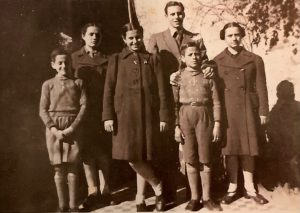
Cohen Family (L-R): Ephraim, Yvonne, Thelma, Menashe, Savas, Mathildi.
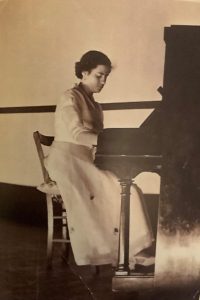
Thelma playing piano-about 18 years old.
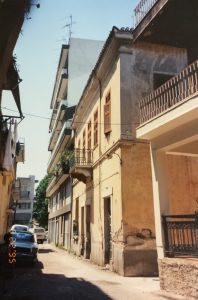
Pictures of the house Thelma grew up.
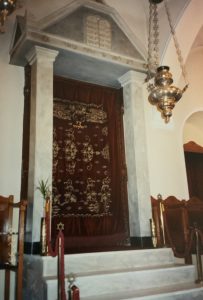
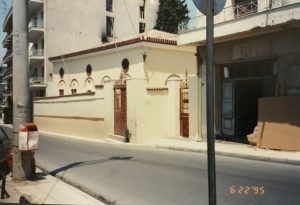
The shul in Chalkis where Giagia Sultana and Thelma both got married.
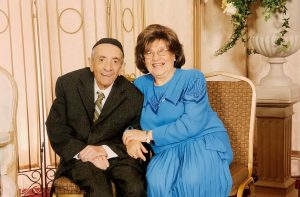
(2007) Thelma and Errikos at the last family simchah before he passed away.
You must be logged in to post a comment.